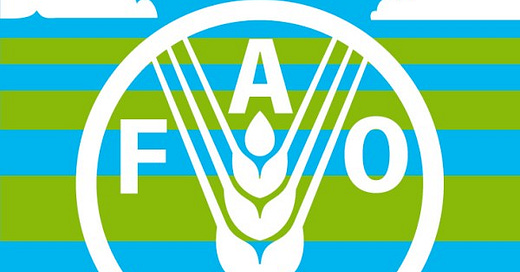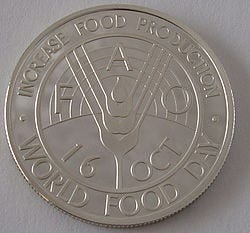Know the themes of World Food Days since 1981
Commemorating the World Food Day 2021 on 16th October...
World Food Day is an international day celebrated every year worldwide on 16 October to commemorate the date of the founding of the United Nations Food and Agriculture Organization in 1945.
The day is celebrated widely by many other organizations concerned with hunger and food security, including the World Food Programme and the International Fund for Agricultural Development.
WFP received the Nobel Prize in Peace for 2020 for their efforts to combat hunger, contribute to peace in conflict areas, and for playing a leading role in stopping the use of hunger in the form of a weapon for war and conflict.
The World Food Day theme for 2014 was Family Farming: "Feeding the world, caring for the earth"; in 2015 it was "Social Protection and Agriculture: Breaking the Cycle of Rural Poverty"; in 2016 it is Climate Change: "Climate is changing. Food and agriculture must too", which echoes the theme of 2008, and of 2002 and 1989 before that. The theme of 2020 was "Grow, nourish, sustain. Together. Our actions are our future."
Since 1981, World Food Day has adopted a different theme each year in order to highlight areas needed for action and provide a common focus. FAO issued World Food Day medals each year to commemorate and promote the anniversary.
Most of the themes revolve around agriculture because only investment in agriculture – together with support for education and health – will turn this situation around. The bulk of that investment will have to come from the private sector, with public investment playing a crucial role, especially in view of its facilitating and stimulating effect on private investment.
In spite of the importance of agriculture as the driving force in the economies of many developing countries, this vital sector is frequently starved of investment. In particular, foreign aid to agriculture has shown marked declines over the past 20 years.
Italian coin dedicated to the first World Food Day (1981)
Afghan coin dedicated to the first World Food Day (1981)
1981: Food comes first
1982: Food comes first
1983: Food security
1984: Women in agriculture
1985: Rural poverty
1986: Fishermen and fishing communities
1987: Small farmers
1988: Rural youth
1989: Food and the environment
1990: Food for the future
1991: Trees for life
1992: Food and nutrition
1993: Harvesting nature's diversity
1994: Water for life
1995: Food for all
1996: Fighting hunger and malnutrition
1997: Investing in food security
1998: Women feed the world
1999: Youth against hunger
2000: A millennium free from hunger
2001: Fight hunger to reduce poverty
2002: Water: source of food security
2003: Working together for an international alliance against hunger
2004: Biodiversity for food security
2005: Agriculture and intercultural dialogue
2006: Investing in agriculture for food security
2007: The right to food
2008: World food security: the challenges of climate change and bioenergy
2009: Achieving food security in times of crisis
2010: United against hunger
2011: Food prices - from crisis to stability
2012: Agricultural cooperatives – key to feeding the world
2013: Sustainable Food Systems for Food Security and Nutrition
2014: Family Farming: "Feeding the world, caring for the earth"
2015: "Social Protection and Agriculture: Breaking the Cycle of Rural Poverty"
2016: Climate change: "Climate is changing. Food and agriculture must too"
2017: Change the future of migration. Invest in food security and rural development.
2018: "Our Actions Are Our Future, Ending World Hunger by 2030 is Possible"
2019: "Our Actions Are Our Future, Healthy Diets for A #ZeroHunger World"
2020: "Grow, Nourish, Sustain. Together"
2021: “Safe food now for a healthy tomorrow”.
Create Ample Awareness about the multifarious dimensions pertaining FOOD…amidst your Institutional Stakeholders
What portion of the family budget of your institutional stakeholders go towards FOOD?
What all is done or can be done to prevent FOOD WASTE?
Does your institution run special programmes to celebrate the food growing families within your institutional ambit?
Tell us more about it all and send it across to editor@rethinkindia.in






